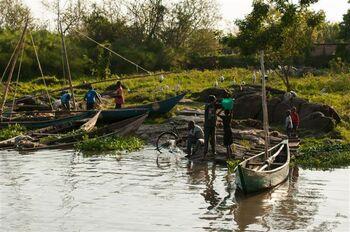Context
The East African Community (EAC) is an association of eight countries that promotes regional economic integration. The region is particularly affected by climate change. Citizens, especially the rural smallholder population, are already feeling the effects of rising temperatures and more frequent extreme weather events such as droughts. The EAC countries have therefore prioritised cross-border cooperation on nature-based solutions. They want to restore and protect ecosystems, such as forests and river ecosystems, to mitigate climate change.
The EAC Secretariat is tasked with coordinating regional climate change policy. Among other things, it has set up river basin organisations for Lake Victoria and Lake Tanganyika to promote climate-adapted development there: the Lake Victoria Basin Commission (LVBC) and the Lake Tanganyika Authority (LTA).
With the Secretariat’s support, all EAC partner countries are also jointly negotiating in the context of the United Nations Framework Convention on Climate Change. They aim to jointly shape international agreements on climate action and benefit from climate finance.
Objective
The EAC and its institutions are supported in financing and implementing nature-based and climate-adapted approaches in East Africa.
Approach
The project advises the EAC in the following areas:
- It integrates nature-based solutions into the EAC’s policy guidelines and regulations and supports the region in climate negotiations. It incorporates gender-sensitive approaches in this context.
- It supports the LVBC and the LTA so that they can plan and coordinate nature-based solutions effectively across borders.
- It improves the organisation of information in databases, for example, to advance climate-resilient water and environmental solutions such as wastewater projects.
Last update: March 2025

